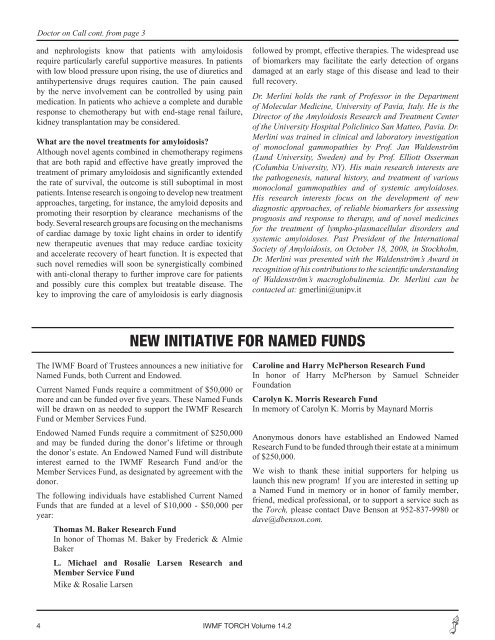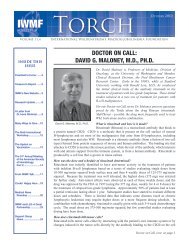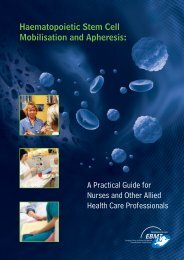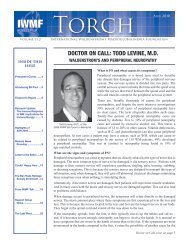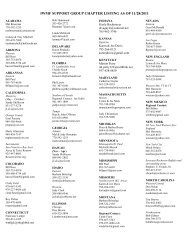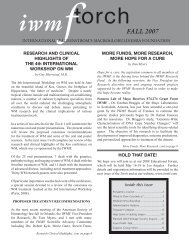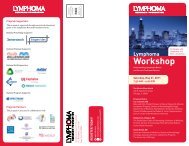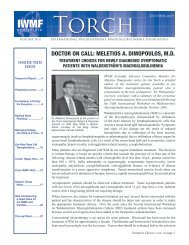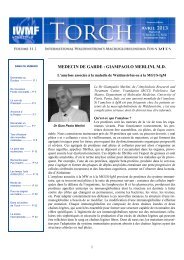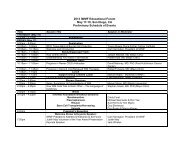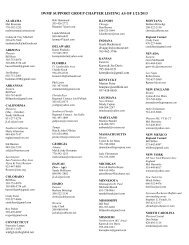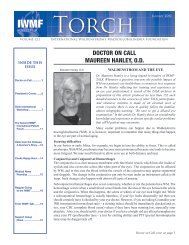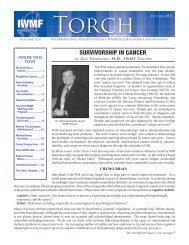English - International Waldenstrom's Macroglobulinemia Foundation
English - International Waldenstrom's Macroglobulinemia Foundation
English - International Waldenstrom's Macroglobulinemia Foundation
Create successful ePaper yourself
Turn your PDF publications into a flip-book with our unique Google optimized e-Paper software.
Doctor on Call cont. from page 3<br />
and nephrologists know that patients with amyloidosis<br />
require particularly careful supportive measures. In patients<br />
with low blood pressure upon rising, the use of diuretics and<br />
antihypertensive drugs requires caution. The pain caused<br />
by the nerve involvement can be controlled by using pain<br />
medication. In patients who achieve a complete and durable<br />
response to chemotherapy but with end-stage renal failure,<br />
kidney transplantation may be considered.<br />
What are the novel treatments for amyloidosis?<br />
Although novel agents combined in chemotherapy regimens<br />
that are both rapid and effective have greatly improved the<br />
treatment of primary amyloidosis and significantly extended<br />
the rate of survival, the outcome is still suboptimal in most<br />
patients. Intense research is ongoing to develop new treatment<br />
approaches, targeting, for instance, the amyloid deposits and<br />
promoting their resorption by clearance mechanisms of the<br />
body. Several research groups are focusing on the mechanisms<br />
of cardiac damage by toxic light chains in order to identify<br />
new therapeutic avenues that may reduce cardiac toxicity<br />
and accelerate recovery of heart function. It is expected that<br />
such novel remedies will soon be synergistically combined<br />
with anti-clonal therapy to further improve care for patients<br />
and possibly cure this complex but treatable disease. The<br />
key to improving the care of amyloidosis is early diagnosis<br />
followed by prompt, effective therapies. The widespread use<br />
of biomarkers may facilitate the early detection of organs<br />
damaged at an early stage of this disease and lead to their<br />
full recovery.<br />
Dr. Merlini holds the rank of Professor in the Department<br />
of Molecular Medicine, University of Pavia, Italy. He is the<br />
Director of the Amyloidosis Research and Treatment Center<br />
of the University Hospital Policlinico San Matteo, Pavia. Dr.<br />
Merlini was trained in clinical and laboratory investigation<br />
of monoclonal gammopathies by Prof. Jan Waldenström<br />
(Lund University, Sweden) and by Prof. Elliott Osserman<br />
(Columbia University, NY). His main research interests are<br />
the pathogenesis, natural history, and treatment of various<br />
monoclonal gammopathies and of systemic amyloidoses.<br />
His research interests focus on the development of new<br />
diagnostic approaches, of reliable biomarkers for assessing<br />
prognosis and response to therapy, and of novel medicines<br />
for the treatment of lympho-plasmacellular disorders and<br />
systemic amyloidoses. Past President of the <strong>International</strong><br />
Society of Amyloidosis, on October 18, 2008, in Stockholm,<br />
Dr. Merlini was presented with the Waldenström’s Award in<br />
recognition of his contributions to the scientific understanding<br />
of Waldenström’s macroglobulinemia. Dr. Merlini can be<br />
contacted at: gmerlini@unipv.it<br />
NEW INITIATIVE FOR NAMED FUNDS<br />
The IWMF Board of Trustees announces a new initiative for<br />
Named Funds, both Current and Endowed.<br />
Current Named Funds require a commitment of $50,000 or<br />
more and can be funded over five years. These Named Funds<br />
will be drawn on as needed to support the IWMF Research<br />
Fund or Member Services Fund.<br />
Endowed Named Funds require a commitment of $250,000<br />
and may be funded during the donor’s lifetime or through<br />
the donor’s estate. An Endowed Named Fund will distribute<br />
interest earned to the IWMF Research Fund and/or the<br />
Member Services Fund, as designated by agreement with the<br />
donor.<br />
The following individuals have established Current Named<br />
Funds that are funded at a level of $10,000 - $50,000 per<br />
year:<br />
Thomas M. Baker Research Fund<br />
In honor of Thomas M. Baker by Frederick & Almie<br />
Baker<br />
L. Michael and Rosalie Larsen Research and<br />
Member Service Fund<br />
Mike & Rosalie Larsen<br />
Caroline and Harry McPherson Research Fund<br />
In honor of Harry McPherson by Samuel Schneider<br />
<strong>Foundation</strong><br />
Carolyn K. Morris Research Fund<br />
In memory of Carolyn K. Morris by Maynard Morris<br />
Anonymous donors have established an Endowed Named<br />
Research Fund to be funded through their estate at a minimum<br />
of $250,000.<br />
We wish to thank these initial supporters for helping us<br />
launch this new program! If you are interested in setting up<br />
a Named Fund in memory or in honor of family member,<br />
friend, medical professional, or to support a service such as<br />
the Torch, please contact Dave Benson at 952-837-9980 or<br />
dave@dbenson.com.<br />
4 IWMF TORCH Volume 14.2


